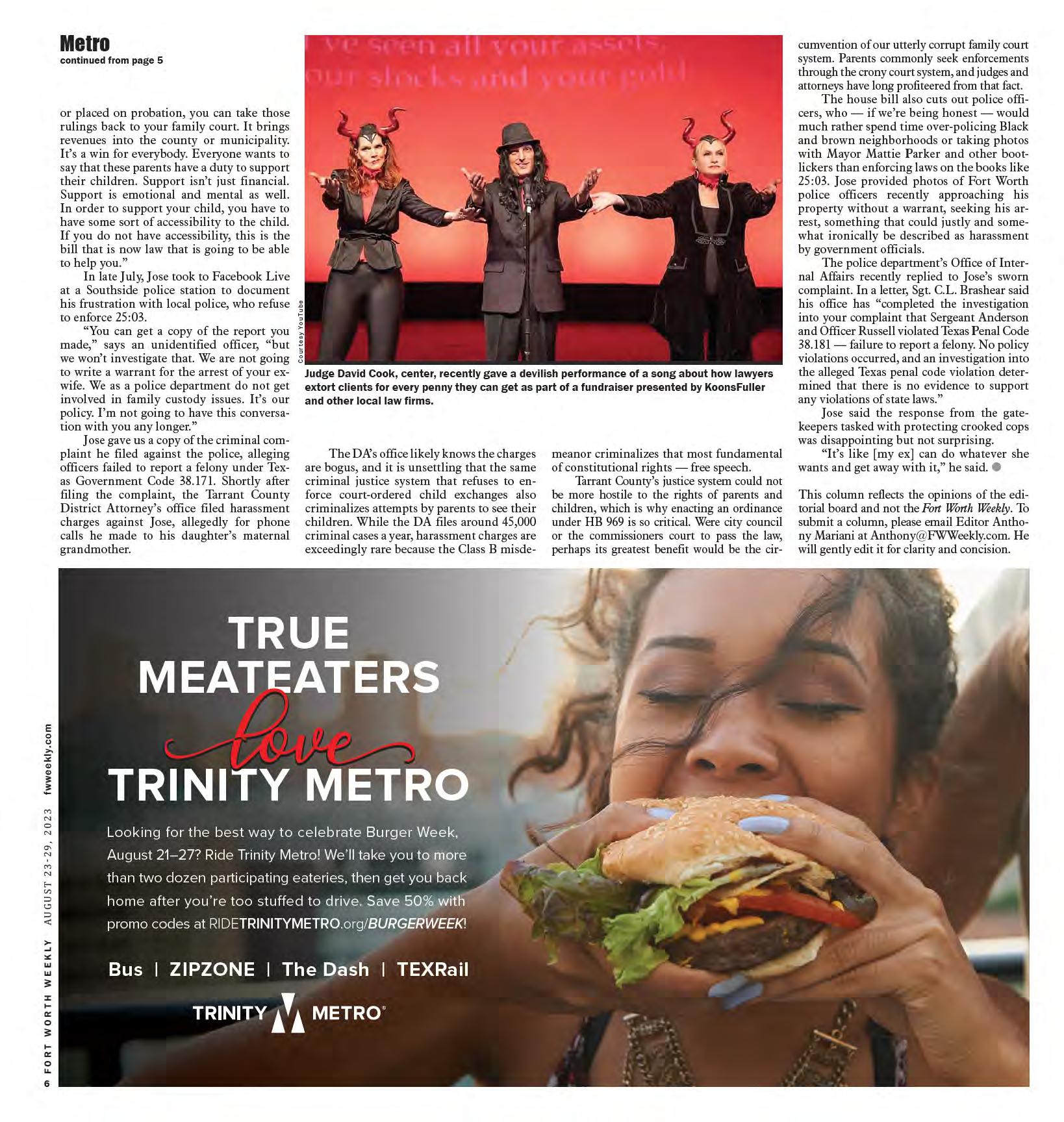








The disdain that local lawyers and judges have toward ordinary citizens recently made national news when a citizen journalist published a video from a recent fundraiser organized by Texas law firm KoonsFuller, local attorneys, and criminal court judge David Cook.

The early-August event at the Fort Worth Community Arts Center featured a lot of song and dance, because that’s what lawyers expect from their clients: to sing, dance, and max out credit cards for representation. Some of the lawyers onstage dressed as demons, and some sang “whiny-ass client” to Cardi B’s “Wet Ass Pussy” as part of this annual fundraiser for local charities.

The combined viewership of the video has reached several hundred thousand with the vast majority of comments blasting Cook, KoonsFuller, and all the other demons for breaching the public trust just for giggles.
“One of the greatest aspects of evil is pride,” reads one comment. “When they’re that proud of themselves and their evil deeds, they cannot keep it to themselves. You may think these monsters would be mad about being exposed, but a part of them takes joy in the world knowing just how evil they are.”
Our PR disaster advice? Plead the Fifth.
Not every parent in Tarrant County has the luxury of hiring sycophant legal counsel to enforce visitation rights. Jose, though recently reunited with his 13-yearold daughter after two years of court-ordered separation, feels she has become noticeably different.
“Man, I almost cried,” he told us, saying that his ex-wife “alienated” their daughter
“big time — I am working hard to get her to how she used to be.”
Jose (not his real name) is frustrated, not only with his ex but with the criminal justice system for not enforcing existing laws intended to ensure both parents obey child custody orders. After 10 years of marriage, Jose and his ex divorced eight years ago. Although their relationship was over, he thought they could amicably co-parent. He was wrong.
Following a divorce or separation, parents can sign enforceable visitation agreements, either through mediation or the local family court system. Many parents believe the decrees are effectively worthless because Fort Worth police refuse to enforce Section 25:03 of the state penal code which makes interfering with a child custody exchange a felony. Police routinely tell parents that child custody matters should be handled in court, where crooked lawyers care more about parents’ bank balances than parental rights. While Texas Family Code was intended to protect the best interests
of children, lawyers and other court officials — based on our extensive interviews and communications with local parents — have found that endless litigation serves the best interests of billable hours.
The abject failure of peace officers to enforce 25:03 is more than dereliction of duty. Those failures often lead to violence. Last December, Arlington resident Tyrone Darling was fatally shot by his son’s mother during an exchange, and two years ago, Chad Read was fatally shot by his ex’s boyfriend during a court-ordered exchange in Lubbock. A grand jury declined to press charges against Read’s killer.
“The criminal justice system utterly failed Jennifer Read, the widow of Chad Read,” said Read’s family in a statement. “Chad Read died unarmed, shot and killed while simply trying to see his son.”
Victims of parental alienation who rightfully no longer trust our justice system now have House Bill 969, the enacted law that allows cities and counties to adopt or-
dinances levying civil penalties on parents who interfere with child custody orders. The fees per violation can be upwards of $500 — something that could quickly change the calculations of self-centered moms and dads using children as pawns to torment their exes. If Fort Worth city council or the Tarrant County Commissioners Court passed such an ordinance, it would allow parents to bypass the underhanded family court system altogether. A peace officer would write a citation, and the matter would be handled in municipal court like a traffic ticket. George Saldana, a family court reformer and backer of HB 969, said enforcements through the ordinance could be used as evidence in family court if needed.
“There’s no remedy on the family court or criminal side” for child custody interference, he said.
The new house bill, he continued, has “great benefits for parents. It creates a paper trail. When [scofflaw parents] are fined
A new house bill cuts lazy peace officers and crooked judges out of child exchange matters, and we say it’s about time.


















